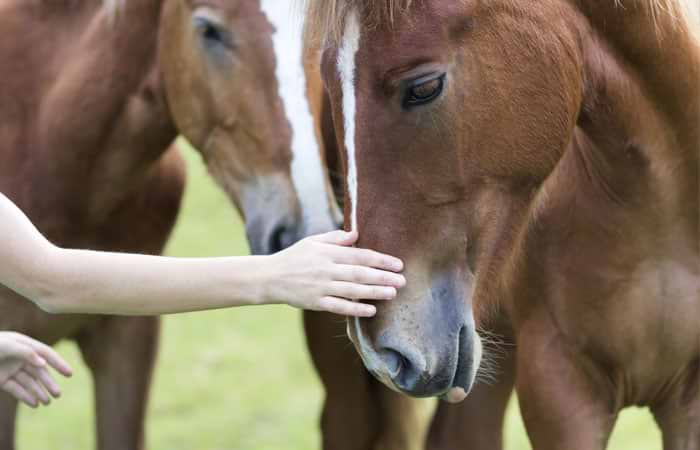
Boasting more than 100,000 members, the British Horse Society is one of the UK's oldest equine charities. By educating people about animal care, it is instrumental in ensuring horse welfare is looked after. It is one of 19 organisations making up the British Equestrian Federation.
While the COVID-19 lockdown is in place, the charity is providing updated information for horse-owners on how to cope. It has detailed how to care for your horse during these challenging times, including preparations for getting back to normality when the restrictions are lifted.

© bilanol / Adobe Stock
Society's aims
The British Horse Society has many aims, the main ones being promoting and advancing public training, safety and education in all aspects of horse ownership and care. The charity oversees equine welfare when it comes to breeding and living environments, actively supporting healthy recreation involving horses for the community. As a watchdog for horse sanctuaries and welfare organisations, it is instrumental in preventing harm, cruelty and neglect.
The society looks into matters involving access and public rights of way for riding and driving horses, including on public roads, footpaths, bridle paths, carriageways and other land. Its core foundations are equine education, welfare, access and safety.
Charity's history
Founded in 1947, the British Horse Society has become the largest and most influential equestrian charity in Britain. It was launched when the National Horse Association of Great Britain and the Institute of the Horse and Pony Club amalgamated.
The society's first president was Brigadier Dame Mary Colvin, who was born into a military family in Sussex in 1907. Her father, Lt Col Forrester Colvin, was a Boer War veteran. After being in the Women's Royal Army Corps, she ran her own indoor riding school. She was a keen rider and a former dressage judge.
A number of riding clubs in England approached the BHS and suggested launching a scheme where they could be affiliated to the charity, while remaining autonomous and running their own affairs. The scheme took off and today, there are more than 440 affiliated clubs and 50-plus affiliated riding centres.
As the Patron of the Society, Her Majesty Queen Elizabeth II is a keen horsewoman herself. The BHS membership has grown to 105,000 people today.
Achievements
The BHS has created a world-class system of training, qualifications and education, such as the Horse Owner's Certificates (aimed at leisure riders) and the Stages examinations for riding instructors and grooms. It also keeps a global register of accredited professional coaches.
It’s Access and Rights of Way department continues to improve the bridleways of Britain. It has created a National Bridleroute Network, detailing equestrian trails that incorporate byways, bridleways and minor roads, with regional groups to support and maintain the network.
The society aims to educate riders and motorists on how to co-exist safely on Britain's roads. More than 4,000 candidates take the Riding and Road Safety test every year. Its website is dedicated to safety advice for the equine community.
Celebrity supporters
The BHS president today is actor, comedian and television presenter Martin Clunes, the star of comedy drama series such as Men Behaving Badly and Doc Martin. As a real animal-lover, he has presented a number of documentaries about animals, including Man and Beast with Martin Clunes.
Other celebrities who have supported the BHS include record company executive, entrepreneur and Britain's Got Talent mogul Simon Cowell and retired jockey Richard Dunwoody, who each donated a signed photo for the charity's auction.
Olympic gold medal-winning dressage star Carl Hester, silver medallist showjumper Lucinda Fredericks and TV presenter Clare Balding, a former flat jockey, are also supporters.
Pandemic advice
During the coronavirus crisis, the BHS has been keeping the equine community informed about what they can and can't do. The organisation's latest advice urges owners to gradually bring their horses back to full fitness to avoid injuries if they haven't been exercised as much recently.
Even if your horse was very fit prior to the lockdown, inevitably, some conditioning will have been lost. If the horse has gained weight, it will put a strain on the tendons, joints and cardiovascular system. This must be at the forefront of your mind when considering returning your horse to work.
Don't confuse eagerness for fitness - changes to the current routine must be brought in gradually. Work out a basic fitness plan for you and your horse and stick to it.
Griggs Equestrian specialises in top-quality branded equestrian products. Our store has now reopened, Monday to Saturday - we're implementing the relevant social distancing measures for the safety of our customers and staff. We look forward to welcoming you back instore!





